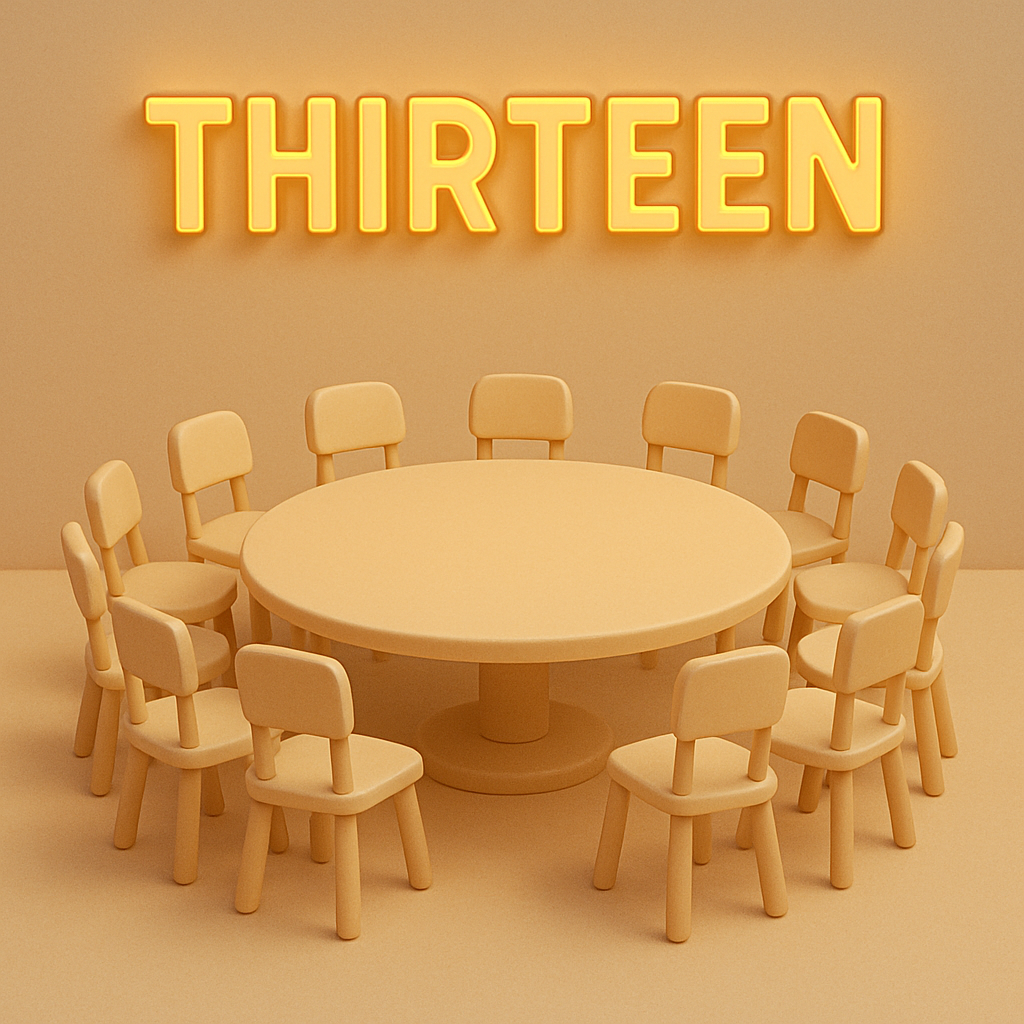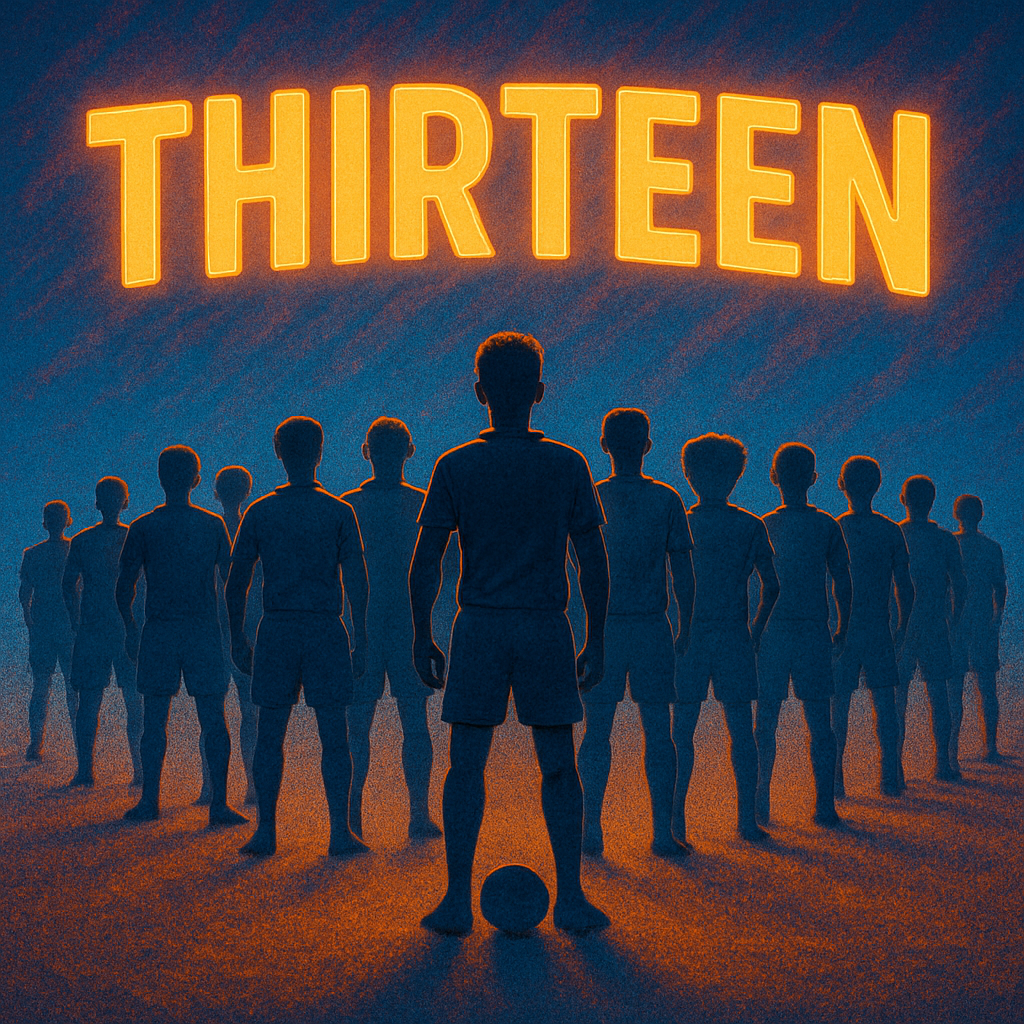Thirteen
Definition
Thirteen is the cardinal number that is equivalent to the sum of twelve and one, or one more than twelve. It is also used as an adjective to describe a quantity of thirteen.
Parts of Speech
- Noun
- Adjective
Pronunciation
American English
- IPA Pronunciation: /ˈθɜrˌtiːn/
- Respelling: THUR-teen
British English
- IPA Pronunciation: /ˈθɜːˌtiːn/
- Respelling: THUR-teen
Etymology
The word "thirteen" originates from Old English "þreotīene," a compound of "þreo" (three) and "tīene" (ten). It is related to Proto-Germanic "*þritehun" and Proto-Indo-European "*trei-deḱm̥," both of which mean "three-ten."
Derivatives
- Thirteenth (adjective/noun)
- Thirteenfold (adjective/adverb)
- Thirteens (noun, plural)
- Thirteener (noun, informal)
- Thirteen-year-old (noun/adjective)
Synonyms
- Baker's dozen
- 13
- Ten plus three
Antonyms
- None
Usage
The noun "thirteen" is used to denote the number, as in "The class has thirteen students." The adjective form is used to describe a quantity, such as "a thirteen-year-old child."
Related Terms
- Number: A mathematical object used to count or measure.
- Cardinal number: A number used to denote quantity (e.g., one, two, three).
- Teen: Numbers from thirteen to nineteen in a counting system.
Detailed Definitions
Noun
- The cardinal number equivalent to twelve plus one: Refers to the integer that comes after twelve and before fourteen.
- Example: "There are thirteen cookies in the jar."
- A group or set of thirteen items: Describes a collection or quantity of thirteen things.
- Example: "She counted thirteen chairs around the table."
Adjective
- Being thirteen in number: Used to describe a quantity of thirteen.
- Example: "The team consists of thirteen players."
thirteen



🇨🇳 Mandarin Chinese
- 十三 (shísān)
- IPA Pronunciation: /ʂɻ̩˥˩san˥/
- English Respelling: shi-san
🇮🇳 Hindi
- तेरह (terah)
- IPA Pronunciation: /t̪eːrɐh/
- English Respelling: tay-rah
🇪🇸 Spanish
- Trece
- IPA Pronunciation: /ˈtɾeθe/
- English Respelling: tray-thay
🇫🇷 French
- Treize
- IPA Pronunciation: /tʁɛz/
- English Respelling: trez
🇸🇦 Modern Standard Arabic
- ثلاثة عشر (thalāthat ‘ashar)
- IPA Pronunciation: /θalæːθa‿ˈʕaʃar/
- English Respelling: tha-la-tha-ashar
🇧🇩 Bengali
- তেরো (terô)
- IPA Pronunciation: /terɔ/
- English Respelling: tay-ro
🇷🇺 Russian
- Тринадцать (trinadtsat')
- IPA Pronunciation: /trʲɪˈnat͡sətʲ/
- English Respelling: tree-naht-sut
🇵🇹 Portuguese
- Treze
- IPA Pronunciation: /ˈtɾe.zɨ/
- English Respelling: tre-zeh
🇮🇩 Indonesian
- Tiga belas
- IPA Pronunciation: /tiga belas/
- English Respelling: tee-gah belas
🇩🇪 German
- Dreizehn
- IPA Pronunciation: /ˈdʁaɪ̯t͡seːn/
- English Respelling: dry-tseen
🇯🇵 Japanese
- 十三 (jūsan)
- IPA Pronunciation: /dʑɯːsaɴ/
- English Respelling: joo-san
🇻🇳 Vietnamese
- Mười ba
- IPA Pronunciation: /mʷəːj˨˩ baː˧/
- English Respelling: mooee ba
🇰🇷 Korean
- 열세 (yeolse)
- IPA Pronunciation: /jʌlsʰe/
- English Respelling: yul-seh
🇹🇷 Turkish
- On üç
- IPA Pronunciation: /on ytʃ/
- English Respelling: on uch
🇵🇰 Urdu
- تیرہ (tērah)
- IPA Pronunciation: /t̪eːɾɑː/
- English Respelling: tay-raa





